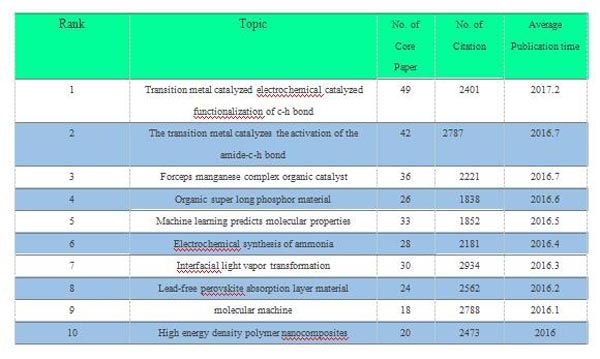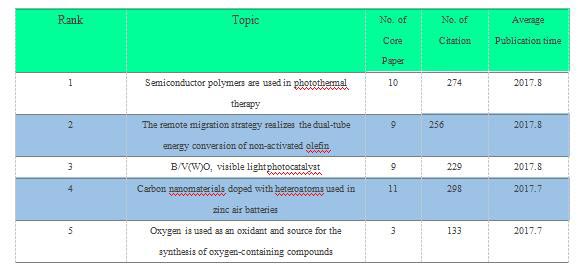Recently, the research institute of science and technology strategy consulting of the Chinese academy of sciences, the literature information center of the Chinese academy of sciences and kerui wei ‘an jointly released the 2019 research frontiers report and the 2019 research frontiers heat index to the world. On the basis of bibliometric indicators, the two reports put forward analysis and explanation on the layout and competitive structure of global science and technology development in 2019, and selected the top 100 hot frontiers and 37 emerging frontiers of ten highly aggregated large subject fields in 2019.
Among them, the Top10 hot frontiers of chemistry and materials science are mainly distributed in the fields of organic synthesis, electrochemical synthesis, advanced materials, and the application of machine learning in chemistry and materials science.
In the field of organic synthesis, c-h bond activation has continuously become a hot front, this year highlighted the combination with electrochemical; Rock Core analyser Carbon and nitrogen bond activation and forceps organic catalysts are the second time to enter the hot front, molecular machinery is the first time to enter; In the field of electrochemical synthesis, electrochemical synthesis ammonia was selected for the first time.
In the field of advanced materials, perovskite materials and high energy density polymer nanocomposites are the hot front of continuous selection. Machine learning, which has been developing rapidly in recent years, is at the forefront of research for the first time.
Table 1. Top10 hot frontiers in chemistry and materials science

A total of 5 studies in this field were selected as emerging frontiers, mainly involving the emerging frontiers of materials such as photocatalysts, zinc air batteries and semiconductor polymers, and the emerging frontiers of organic chemical reactions such as the functionalization of non-activated alkenes and the synthesis of oxygen-containing compounds.
Table 2. New frontiers in chemistry and materials science

It can be seen that the frontiers of chemistry and materials science are focused on polymers and electrochemistry. Corresponding material inspection field, electrochemical testing instrument, such as electrochemical workstation, charging and discharging test devices, etc.), spectral instrumentation (such as infrared spectroscopy, etc.), chromatography testing instrument penetration (e.g., liquid chromatography, gel chromatography, liquid mass spectrometry, etc.), thermal analysis instrument (such as differential scanning calorimetry, thermogravimetric analyzer and synchronous thermal analyzer, etc.), nuclear magnetic resonance (NMR)instrument market, etc may be accompanied by “hot” material, is expected to achieve considerable market growth in the future.
 NIUMAG
NIUMAG